Effective Teamwork Strategies: A Report on Group Dynamics
VerifiedAdded on 2020/06/06
|11
|2487
|43
Report
AI Summary
This report delves into the critical role of teamwork within organizations, exploring its importance in achieving common goals and objectives. It examines the benefits of teamwork, including enhanced problem-solving capabilities, improved communication, increased cohesion, and opportunities for learning and high performance. The report then analyzes various theories related to group dynamics, such as Belbin's and Tuckman's theories, which provide frameworks for understanding team roles and stages of group development. Furthermore, it emphasizes the ethical requirements essential for effective teamwork, highlighting the importance of a strong code of conduct and positive working environment. Finally, the report outlines the organization of knowledge and learning within teams, including group strategies, shared objectives, agreements, meaningful schedules, and effective delegation, concluding with the vital importance of teamwork for organizational success.
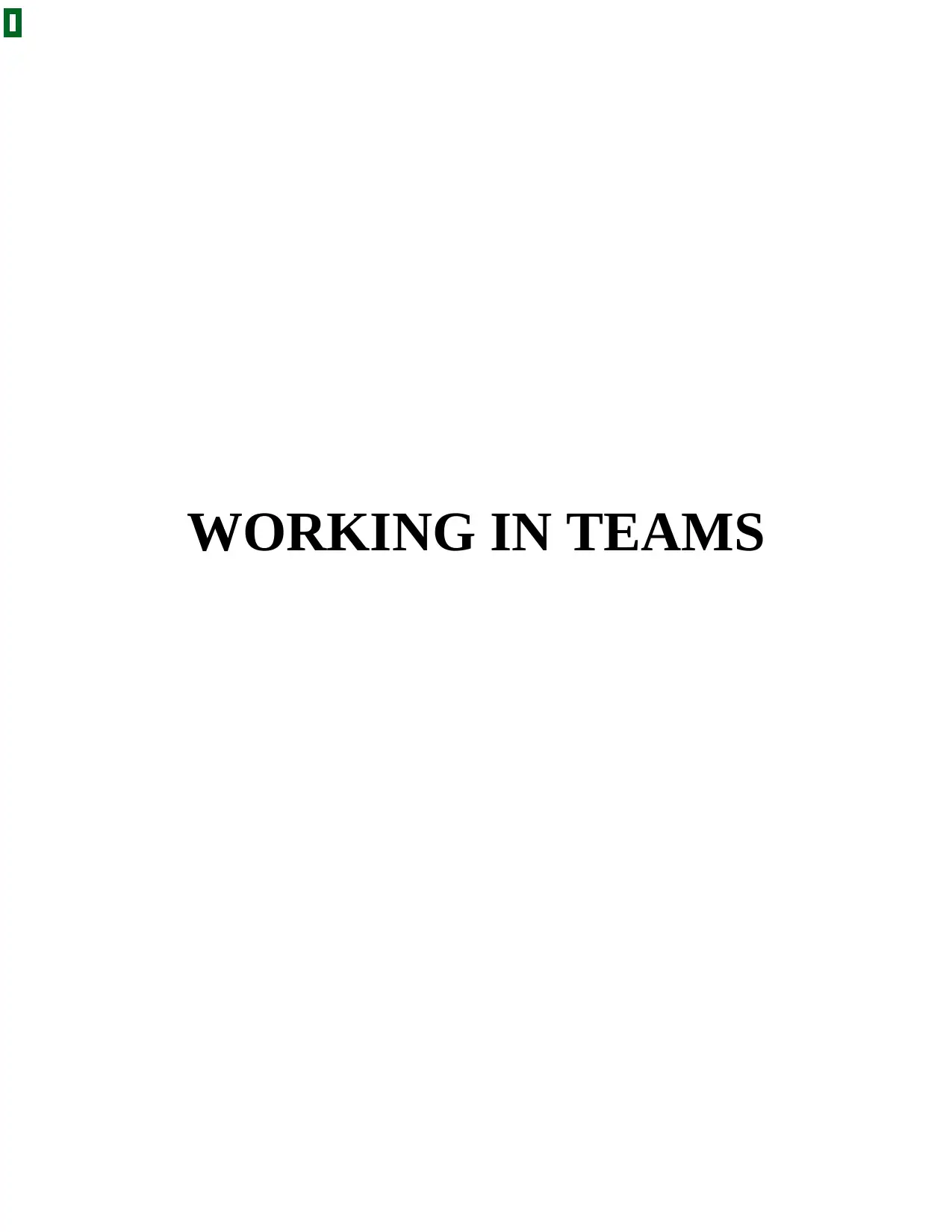
WORKING IN TEAMS
Paraphrase This Document
Need a fresh take? Get an instant paraphrase of this document with our AI Paraphraser
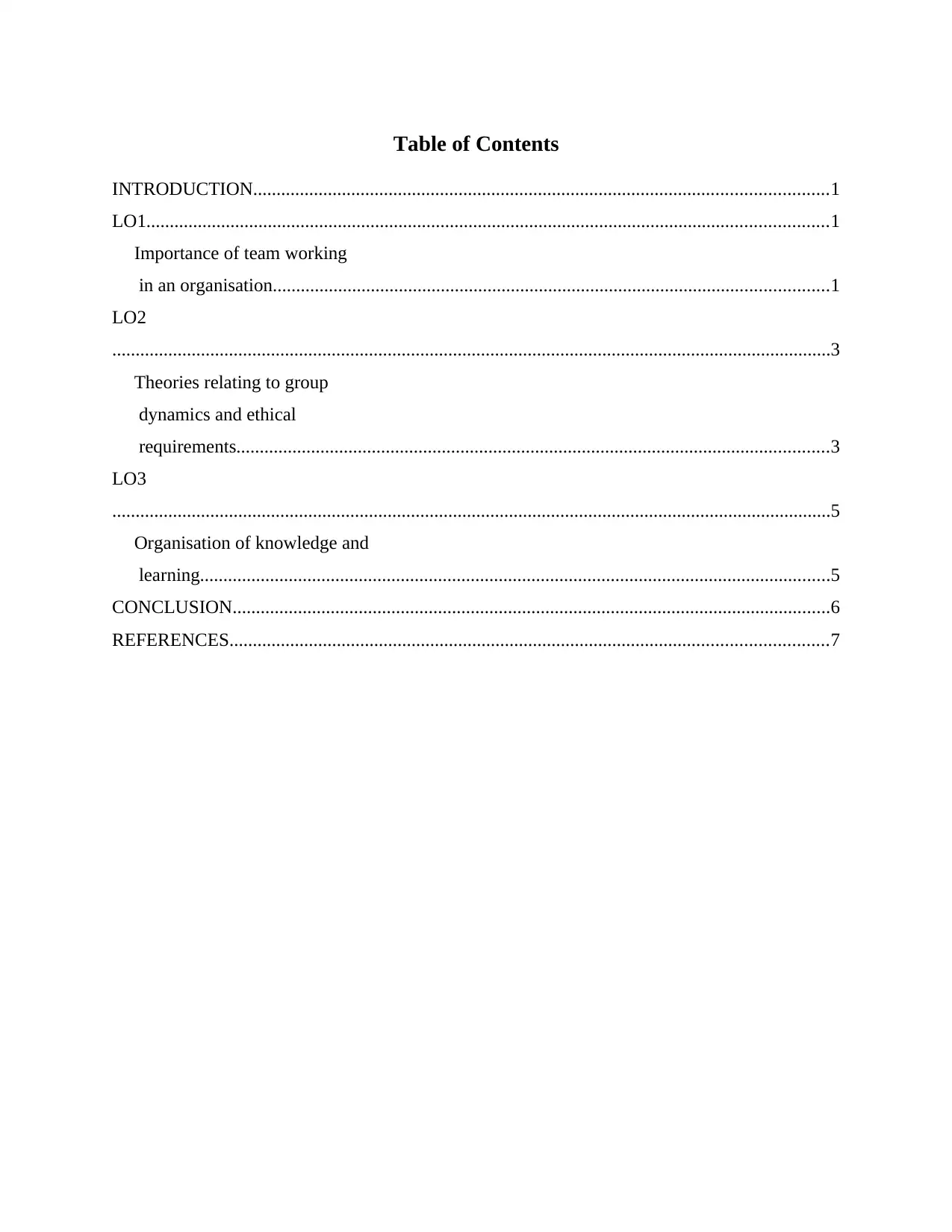
Table of Contents
INTRODUCTION...........................................................................................................................1
LO1..................................................................................................................................................1
Importance of team working
in an organisation.......................................................................................................................1
LO2
..........................................................................................................................................................3
Theories relating to group
dynamics and ethical
requirements...............................................................................................................................3
LO3
..........................................................................................................................................................5
Organisation of knowledge and
learning.......................................................................................................................................5
CONCLUSION................................................................................................................................6
REFERENCES................................................................................................................................7
INTRODUCTION...........................................................................................................................1
LO1..................................................................................................................................................1
Importance of team working
in an organisation.......................................................................................................................1
LO2
..........................................................................................................................................................3
Theories relating to group
dynamics and ethical
requirements...............................................................................................................................3
LO3
..........................................................................................................................................................5
Organisation of knowledge and
learning.......................................................................................................................................5
CONCLUSION................................................................................................................................6
REFERENCES................................................................................................................................7

⊘ This is a preview!⊘
Do you want full access?
Subscribe today to unlock all pages.

Trusted by 1+ million students worldwide
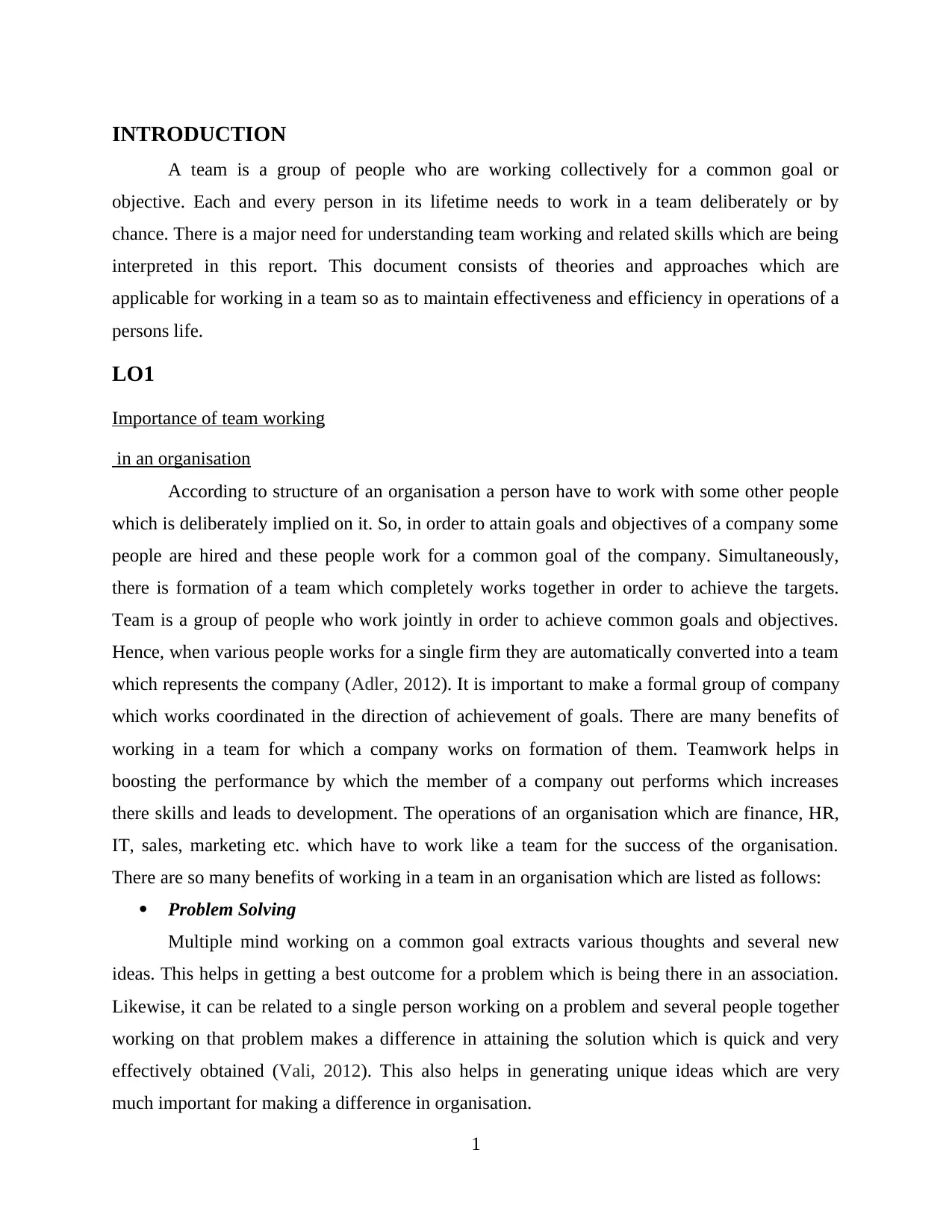
INTRODUCTION
A team is a group of people who are working collectively for a common goal or
objective. Each and every person in its lifetime needs to work in a team deliberately or by
chance. There is a major need for understanding team working and related skills which are being
interpreted in this report. This document consists of theories and approaches which are
applicable for working in a team so as to maintain effectiveness and efficiency in operations of a
persons life.
LO1
Importance of team working
in an organisation
According to structure of an organisation a person have to work with some other people
which is deliberately implied on it. So, in order to attain goals and objectives of a company some
people are hired and these people work for a common goal of the company. Simultaneously,
there is formation of a team which completely works together in order to achieve the targets.
Team is a group of people who work jointly in order to achieve common goals and objectives.
Hence, when various people works for a single firm they are automatically converted into a team
which represents the company (Adler, 2012). It is important to make a formal group of company
which works coordinated in the direction of achievement of goals. There are many benefits of
working in a team for which a company works on formation of them. Teamwork helps in
boosting the performance by which the member of a company out performs which increases
there skills and leads to development. The operations of an organisation which are finance, HR,
IT, sales, marketing etc. which have to work like a team for the success of the organisation.
There are so many benefits of working in a team in an organisation which are listed as follows:
Problem Solving
Multiple mind working on a common goal extracts various thoughts and several new
ideas. This helps in getting a best outcome for a problem which is being there in an association.
Likewise, it can be related to a single person working on a problem and several people together
working on that problem makes a difference in attaining the solution which is quick and very
effectively obtained (Vali, 2012). This also helps in generating unique ideas which are very
much important for making a difference in organisation.
1
A team is a group of people who are working collectively for a common goal or
objective. Each and every person in its lifetime needs to work in a team deliberately or by
chance. There is a major need for understanding team working and related skills which are being
interpreted in this report. This document consists of theories and approaches which are
applicable for working in a team so as to maintain effectiveness and efficiency in operations of a
persons life.
LO1
Importance of team working
in an organisation
According to structure of an organisation a person have to work with some other people
which is deliberately implied on it. So, in order to attain goals and objectives of a company some
people are hired and these people work for a common goal of the company. Simultaneously,
there is formation of a team which completely works together in order to achieve the targets.
Team is a group of people who work jointly in order to achieve common goals and objectives.
Hence, when various people works for a single firm they are automatically converted into a team
which represents the company (Adler, 2012). It is important to make a formal group of company
which works coordinated in the direction of achievement of goals. There are many benefits of
working in a team for which a company works on formation of them. Teamwork helps in
boosting the performance by which the member of a company out performs which increases
there skills and leads to development. The operations of an organisation which are finance, HR,
IT, sales, marketing etc. which have to work like a team for the success of the organisation.
There are so many benefits of working in a team in an organisation which are listed as follows:
Problem Solving
Multiple mind working on a common goal extracts various thoughts and several new
ideas. This helps in getting a best outcome for a problem which is being there in an association.
Likewise, it can be related to a single person working on a problem and several people together
working on that problem makes a difference in attaining the solution which is quick and very
effectively obtained (Vali, 2012). This also helps in generating unique ideas which are very
much important for making a difference in organisation.
1
Paraphrase This Document
Need a fresh take? Get an instant paraphrase of this document with our AI Paraphraser
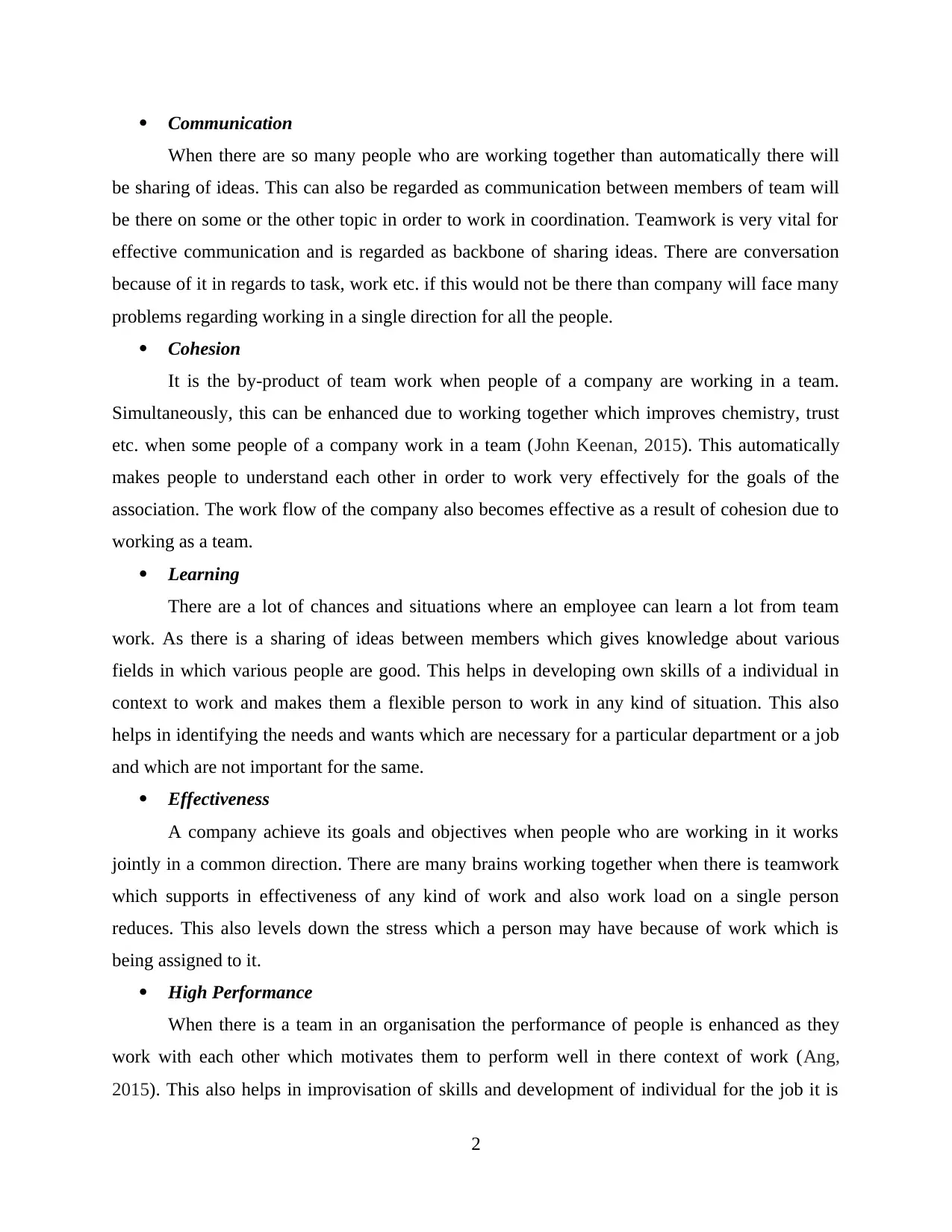
Communication
When there are so many people who are working together than automatically there will
be sharing of ideas. This can also be regarded as communication between members of team will
be there on some or the other topic in order to work in coordination. Teamwork is very vital for
effective communication and is regarded as backbone of sharing ideas. There are conversation
because of it in regards to task, work etc. if this would not be there than company will face many
problems regarding working in a single direction for all the people.
Cohesion
It is the by-product of team work when people of a company are working in a team.
Simultaneously, this can be enhanced due to working together which improves chemistry, trust
etc. when some people of a company work in a team (John Keenan, 2015). This automatically
makes people to understand each other in order to work very effectively for the goals of the
association. The work flow of the company also becomes effective as a result of cohesion due to
working as a team.
Learning
There are a lot of chances and situations where an employee can learn a lot from team
work. As there is a sharing of ideas between members which gives knowledge about various
fields in which various people are good. This helps in developing own skills of a individual in
context to work and makes them a flexible person to work in any kind of situation. This also
helps in identifying the needs and wants which are necessary for a particular department or a job
and which are not important for the same.
Effectiveness
A company achieve its goals and objectives when people who are working in it works
jointly in a common direction. There are many brains working together when there is teamwork
which supports in effectiveness of any kind of work and also work load on a single person
reduces. This also levels down the stress which a person may have because of work which is
being assigned to it.
High Performance
When there is a team in an organisation the performance of people is enhanced as they
work with each other which motivates them to perform well in there context of work (Ang,
2015). This also helps in improvisation of skills and development of individual for the job it is
2
When there are so many people who are working together than automatically there will
be sharing of ideas. This can also be regarded as communication between members of team will
be there on some or the other topic in order to work in coordination. Teamwork is very vital for
effective communication and is regarded as backbone of sharing ideas. There are conversation
because of it in regards to task, work etc. if this would not be there than company will face many
problems regarding working in a single direction for all the people.
Cohesion
It is the by-product of team work when people of a company are working in a team.
Simultaneously, this can be enhanced due to working together which improves chemistry, trust
etc. when some people of a company work in a team (John Keenan, 2015). This automatically
makes people to understand each other in order to work very effectively for the goals of the
association. The work flow of the company also becomes effective as a result of cohesion due to
working as a team.
Learning
There are a lot of chances and situations where an employee can learn a lot from team
work. As there is a sharing of ideas between members which gives knowledge about various
fields in which various people are good. This helps in developing own skills of a individual in
context to work and makes them a flexible person to work in any kind of situation. This also
helps in identifying the needs and wants which are necessary for a particular department or a job
and which are not important for the same.
Effectiveness
A company achieve its goals and objectives when people who are working in it works
jointly in a common direction. There are many brains working together when there is teamwork
which supports in effectiveness of any kind of work and also work load on a single person
reduces. This also levels down the stress which a person may have because of work which is
being assigned to it.
High Performance
When there is a team in an organisation the performance of people is enhanced as they
work with each other which motivates them to perform well in there context of work (Ang,
2015). This also helps in improvisation of skills and development of individual for the job it is
2
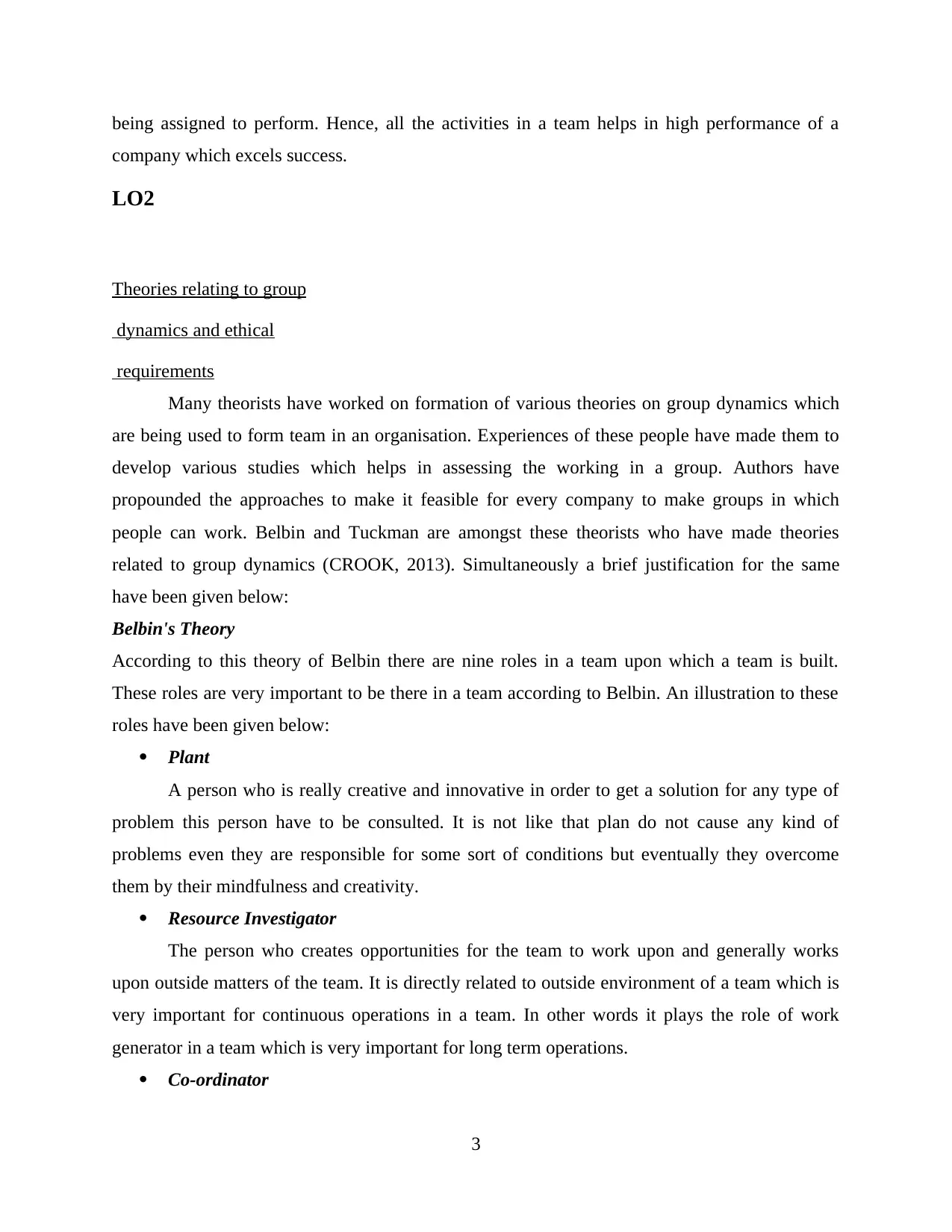
being assigned to perform. Hence, all the activities in a team helps in high performance of a
company which excels success.
LO2
Theories relating to group
dynamics and ethical
requirements
Many theorists have worked on formation of various theories on group dynamics which
are being used to form team in an organisation. Experiences of these people have made them to
develop various studies which helps in assessing the working in a group. Authors have
propounded the approaches to make it feasible for every company to make groups in which
people can work. Belbin and Tuckman are amongst these theorists who have made theories
related to group dynamics (CROOK, 2013). Simultaneously a brief justification for the same
have been given below:
Belbin's Theory
According to this theory of Belbin there are nine roles in a team upon which a team is built.
These roles are very important to be there in a team according to Belbin. An illustration to these
roles have been given below:
Plant
A person who is really creative and innovative in order to get a solution for any type of
problem this person have to be consulted. It is not like that plan do not cause any kind of
problems even they are responsible for some sort of conditions but eventually they overcome
them by their mindfulness and creativity.
Resource Investigator
The person who creates opportunities for the team to work upon and generally works
upon outside matters of the team. It is directly related to outside environment of a team which is
very important for continuous operations in a team. In other words it plays the role of work
generator in a team which is very important for long term operations.
Co-ordinator
3
company which excels success.
LO2
Theories relating to group
dynamics and ethical
requirements
Many theorists have worked on formation of various theories on group dynamics which
are being used to form team in an organisation. Experiences of these people have made them to
develop various studies which helps in assessing the working in a group. Authors have
propounded the approaches to make it feasible for every company to make groups in which
people can work. Belbin and Tuckman are amongst these theorists who have made theories
related to group dynamics (CROOK, 2013). Simultaneously a brief justification for the same
have been given below:
Belbin's Theory
According to this theory of Belbin there are nine roles in a team upon which a team is built.
These roles are very important to be there in a team according to Belbin. An illustration to these
roles have been given below:
Plant
A person who is really creative and innovative in order to get a solution for any type of
problem this person have to be consulted. It is not like that plan do not cause any kind of
problems even they are responsible for some sort of conditions but eventually they overcome
them by their mindfulness and creativity.
Resource Investigator
The person who creates opportunities for the team to work upon and generally works
upon outside matters of the team. It is directly related to outside environment of a team which is
very important for continuous operations in a team. In other words it plays the role of work
generator in a team which is very important for long term operations.
Co-ordinator
3
⊘ This is a preview!⊘
Do you want full access?
Subscribe today to unlock all pages.

Trusted by 1+ million students worldwide
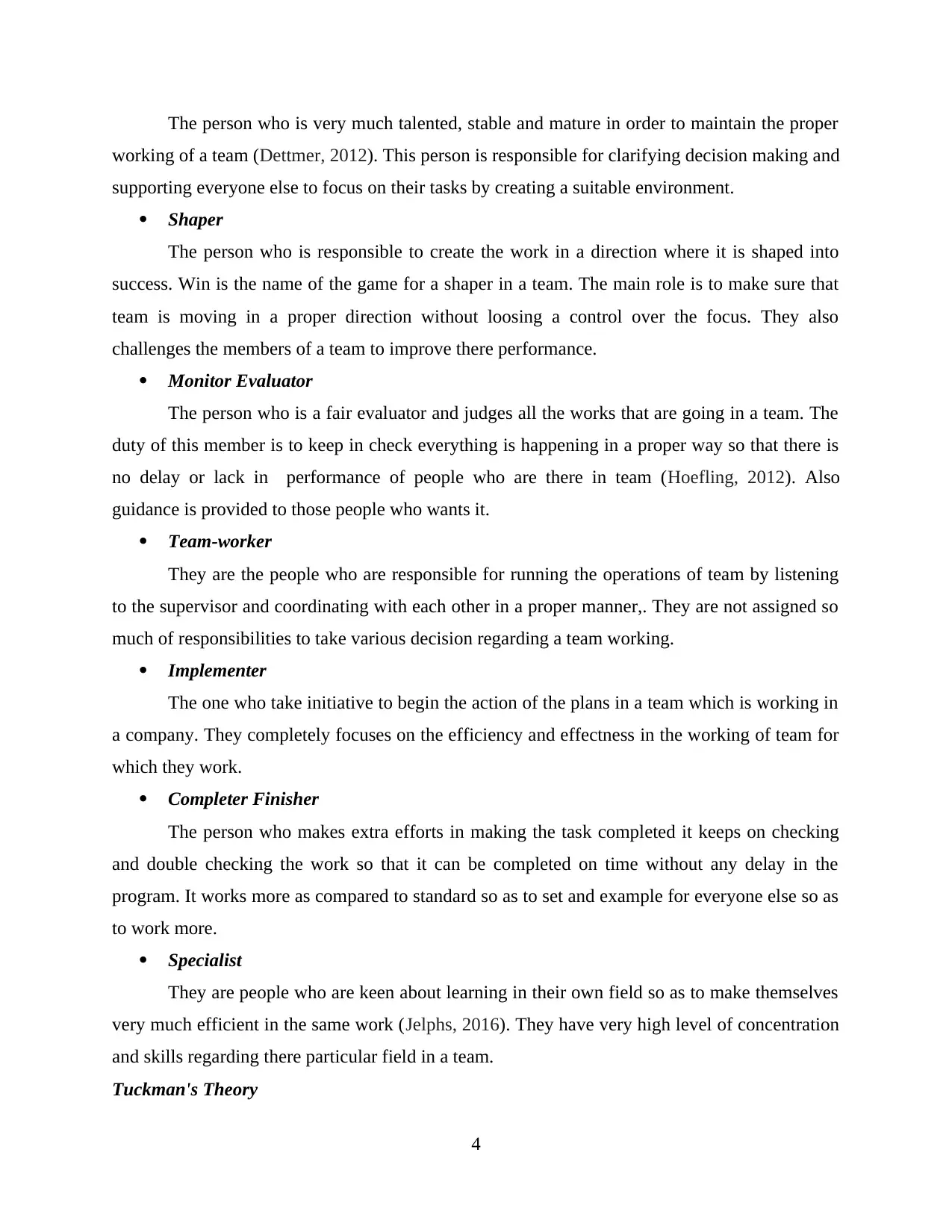
The person who is very much talented, stable and mature in order to maintain the proper
working of a team (Dettmer, 2012). This person is responsible for clarifying decision making and
supporting everyone else to focus on their tasks by creating a suitable environment.
Shaper
The person who is responsible to create the work in a direction where it is shaped into
success. Win is the name of the game for a shaper in a team. The main role is to make sure that
team is moving in a proper direction without loosing a control over the focus. They also
challenges the members of a team to improve there performance.
Monitor Evaluator
The person who is a fair evaluator and judges all the works that are going in a team. The
duty of this member is to keep in check everything is happening in a proper way so that there is
no delay or lack in performance of people who are there in team (Hoefling, 2012). Also
guidance is provided to those people who wants it.
Team-worker
They are the people who are responsible for running the operations of team by listening
to the supervisor and coordinating with each other in a proper manner,. They are not assigned so
much of responsibilities to take various decision regarding a team working.
Implementer
The one who take initiative to begin the action of the plans in a team which is working in
a company. They completely focuses on the efficiency and effectness in the working of team for
which they work.
Completer Finisher
The person who makes extra efforts in making the task completed it keeps on checking
and double checking the work so that it can be completed on time without any delay in the
program. It works more as compared to standard so as to set and example for everyone else so as
to work more.
Specialist
They are people who are keen about learning in their own field so as to make themselves
very much efficient in the same work (Jelphs, 2016). They have very high level of concentration
and skills regarding there particular field in a team.
Tuckman's Theory
4
working of a team (Dettmer, 2012). This person is responsible for clarifying decision making and
supporting everyone else to focus on their tasks by creating a suitable environment.
Shaper
The person who is responsible to create the work in a direction where it is shaped into
success. Win is the name of the game for a shaper in a team. The main role is to make sure that
team is moving in a proper direction without loosing a control over the focus. They also
challenges the members of a team to improve there performance.
Monitor Evaluator
The person who is a fair evaluator and judges all the works that are going in a team. The
duty of this member is to keep in check everything is happening in a proper way so that there is
no delay or lack in performance of people who are there in team (Hoefling, 2012). Also
guidance is provided to those people who wants it.
Team-worker
They are the people who are responsible for running the operations of team by listening
to the supervisor and coordinating with each other in a proper manner,. They are not assigned so
much of responsibilities to take various decision regarding a team working.
Implementer
The one who take initiative to begin the action of the plans in a team which is working in
a company. They completely focuses on the efficiency and effectness in the working of team for
which they work.
Completer Finisher
The person who makes extra efforts in making the task completed it keeps on checking
and double checking the work so that it can be completed on time without any delay in the
program. It works more as compared to standard so as to set and example for everyone else so as
to work more.
Specialist
They are people who are keen about learning in their own field so as to make themselves
very much efficient in the same work (Jelphs, 2016). They have very high level of concentration
and skills regarding there particular field in a team.
Tuckman's Theory
4
Paraphrase This Document
Need a fresh take? Get an instant paraphrase of this document with our AI Paraphraser
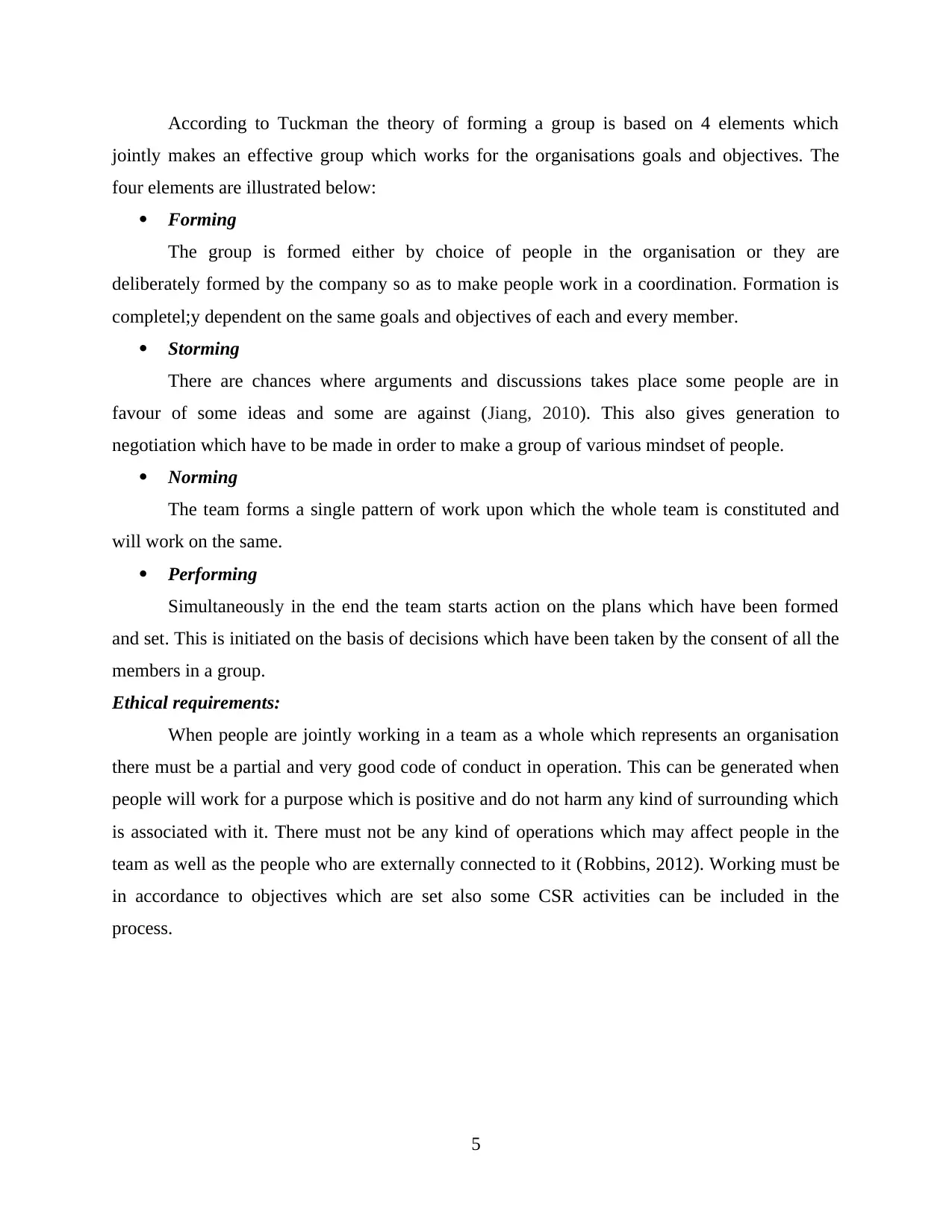
According to Tuckman the theory of forming a group is based on 4 elements which
jointly makes an effective group which works for the organisations goals and objectives. The
four elements are illustrated below:
Forming
The group is formed either by choice of people in the organisation or they are
deliberately formed by the company so as to make people work in a coordination. Formation is
completel;y dependent on the same goals and objectives of each and every member.
Storming
There are chances where arguments and discussions takes place some people are in
favour of some ideas and some are against (Jiang, 2010). This also gives generation to
negotiation which have to be made in order to make a group of various mindset of people.
Norming
The team forms a single pattern of work upon which the whole team is constituted and
will work on the same.
Performing
Simultaneously in the end the team starts action on the plans which have been formed
and set. This is initiated on the basis of decisions which have been taken by the consent of all the
members in a group.
Ethical requirements:
When people are jointly working in a team as a whole which represents an organisation
there must be a partial and very good code of conduct in operation. This can be generated when
people will work for a purpose which is positive and do not harm any kind of surrounding which
is associated with it. There must not be any kind of operations which may affect people in the
team as well as the people who are externally connected to it (Robbins, 2012). Working must be
in accordance to objectives which are set also some CSR activities can be included in the
process.
5
jointly makes an effective group which works for the organisations goals and objectives. The
four elements are illustrated below:
Forming
The group is formed either by choice of people in the organisation or they are
deliberately formed by the company so as to make people work in a coordination. Formation is
completel;y dependent on the same goals and objectives of each and every member.
Storming
There are chances where arguments and discussions takes place some people are in
favour of some ideas and some are against (Jiang, 2010). This also gives generation to
negotiation which have to be made in order to make a group of various mindset of people.
Norming
The team forms a single pattern of work upon which the whole team is constituted and
will work on the same.
Performing
Simultaneously in the end the team starts action on the plans which have been formed
and set. This is initiated on the basis of decisions which have been taken by the consent of all the
members in a group.
Ethical requirements:
When people are jointly working in a team as a whole which represents an organisation
there must be a partial and very good code of conduct in operation. This can be generated when
people will work for a purpose which is positive and do not harm any kind of surrounding which
is associated with it. There must not be any kind of operations which may affect people in the
team as well as the people who are externally connected to it (Robbins, 2012). Working must be
in accordance to objectives which are set also some CSR activities can be included in the
process.
5
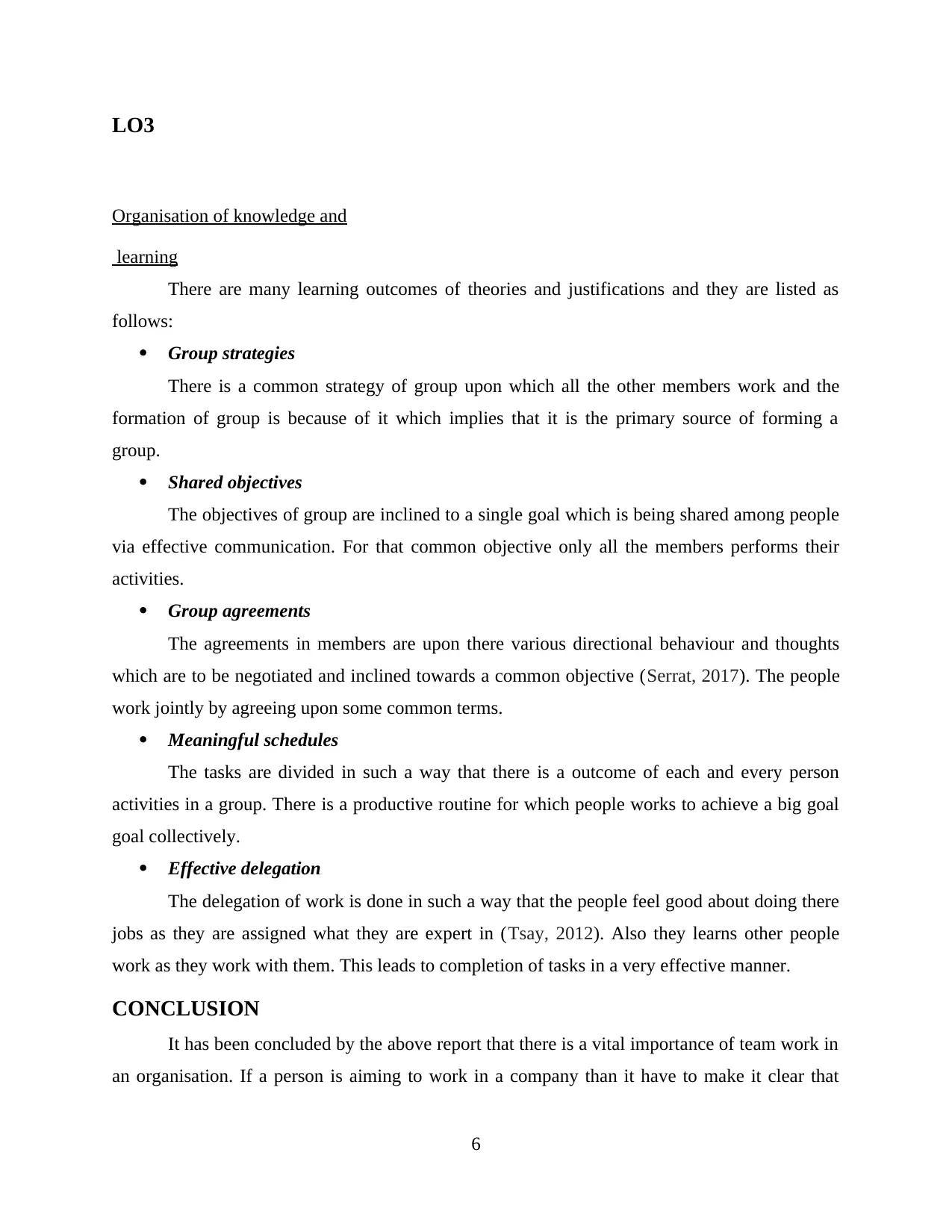
LO3
Organisation of knowledge and
learning
There are many learning outcomes of theories and justifications and they are listed as
follows:
Group strategies
There is a common strategy of group upon which all the other members work and the
formation of group is because of it which implies that it is the primary source of forming a
group.
Shared objectives
The objectives of group are inclined to a single goal which is being shared among people
via effective communication. For that common objective only all the members performs their
activities.
Group agreements
The agreements in members are upon there various directional behaviour and thoughts
which are to be negotiated and inclined towards a common objective (Serrat, 2017). The people
work jointly by agreeing upon some common terms.
Meaningful schedules
The tasks are divided in such a way that there is a outcome of each and every person
activities in a group. There is a productive routine for which people works to achieve a big goal
goal collectively.
Effective delegation
The delegation of work is done in such a way that the people feel good about doing there
jobs as they are assigned what they are expert in (Tsay, 2012). Also they learns other people
work as they work with them. This leads to completion of tasks in a very effective manner.
CONCLUSION
It has been concluded by the above report that there is a vital importance of team work in
an organisation. If a person is aiming to work in a company than it have to make it clear that
6
Organisation of knowledge and
learning
There are many learning outcomes of theories and justifications and they are listed as
follows:
Group strategies
There is a common strategy of group upon which all the other members work and the
formation of group is because of it which implies that it is the primary source of forming a
group.
Shared objectives
The objectives of group are inclined to a single goal which is being shared among people
via effective communication. For that common objective only all the members performs their
activities.
Group agreements
The agreements in members are upon there various directional behaviour and thoughts
which are to be negotiated and inclined towards a common objective (Serrat, 2017). The people
work jointly by agreeing upon some common terms.
Meaningful schedules
The tasks are divided in such a way that there is a outcome of each and every person
activities in a group. There is a productive routine for which people works to achieve a big goal
goal collectively.
Effective delegation
The delegation of work is done in such a way that the people feel good about doing there
jobs as they are assigned what they are expert in (Tsay, 2012). Also they learns other people
work as they work with them. This leads to completion of tasks in a very effective manner.
CONCLUSION
It has been concluded by the above report that there is a vital importance of team work in
an organisation. If a person is aiming to work in a company than it have to make it clear that
6
⊘ This is a preview!⊘
Do you want full access?
Subscribe today to unlock all pages.

Trusted by 1+ million students worldwide
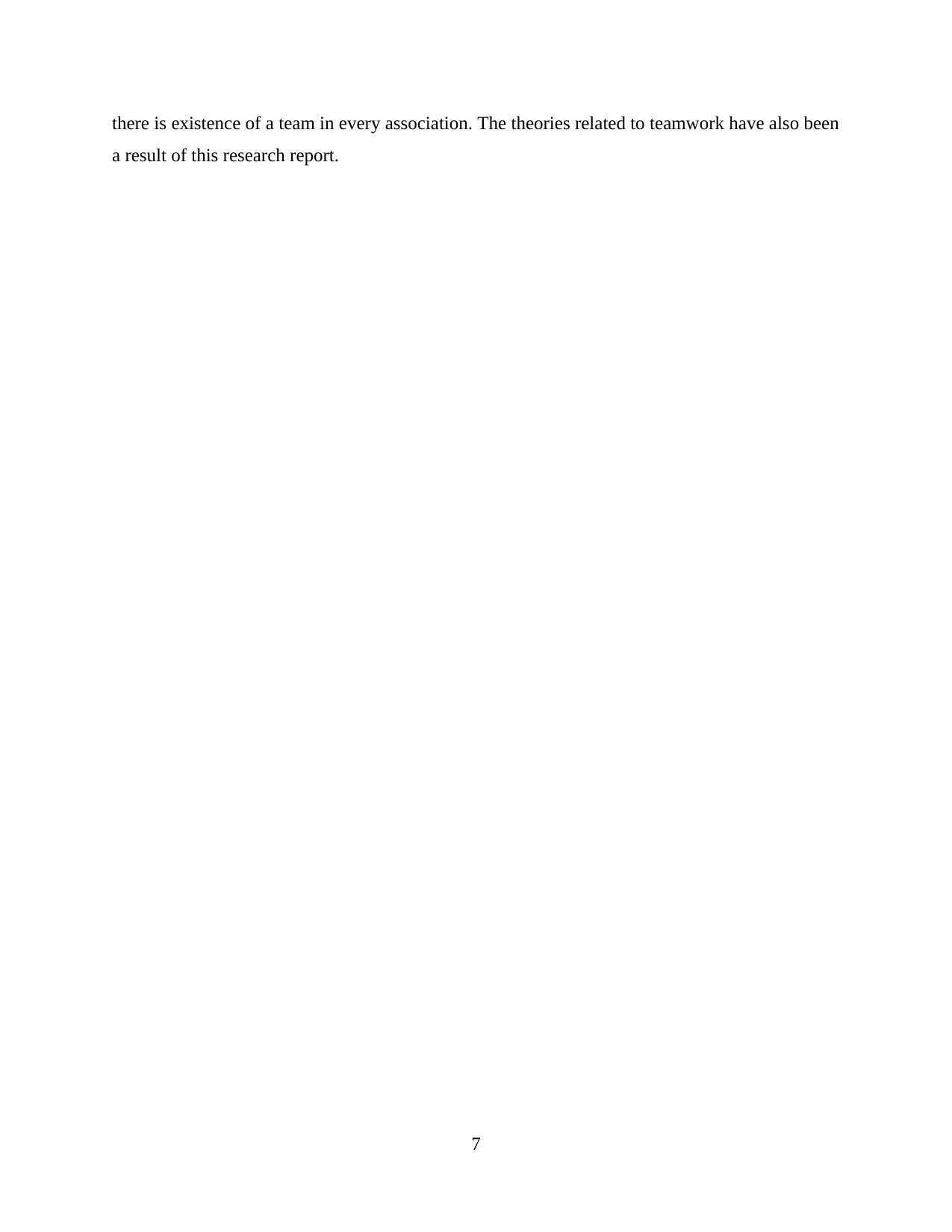
there is existence of a team in every association. The theories related to teamwork have also been
a result of this research report.
7
a result of this research report.
7
Paraphrase This Document
Need a fresh take? Get an instant paraphrase of this document with our AI Paraphraser
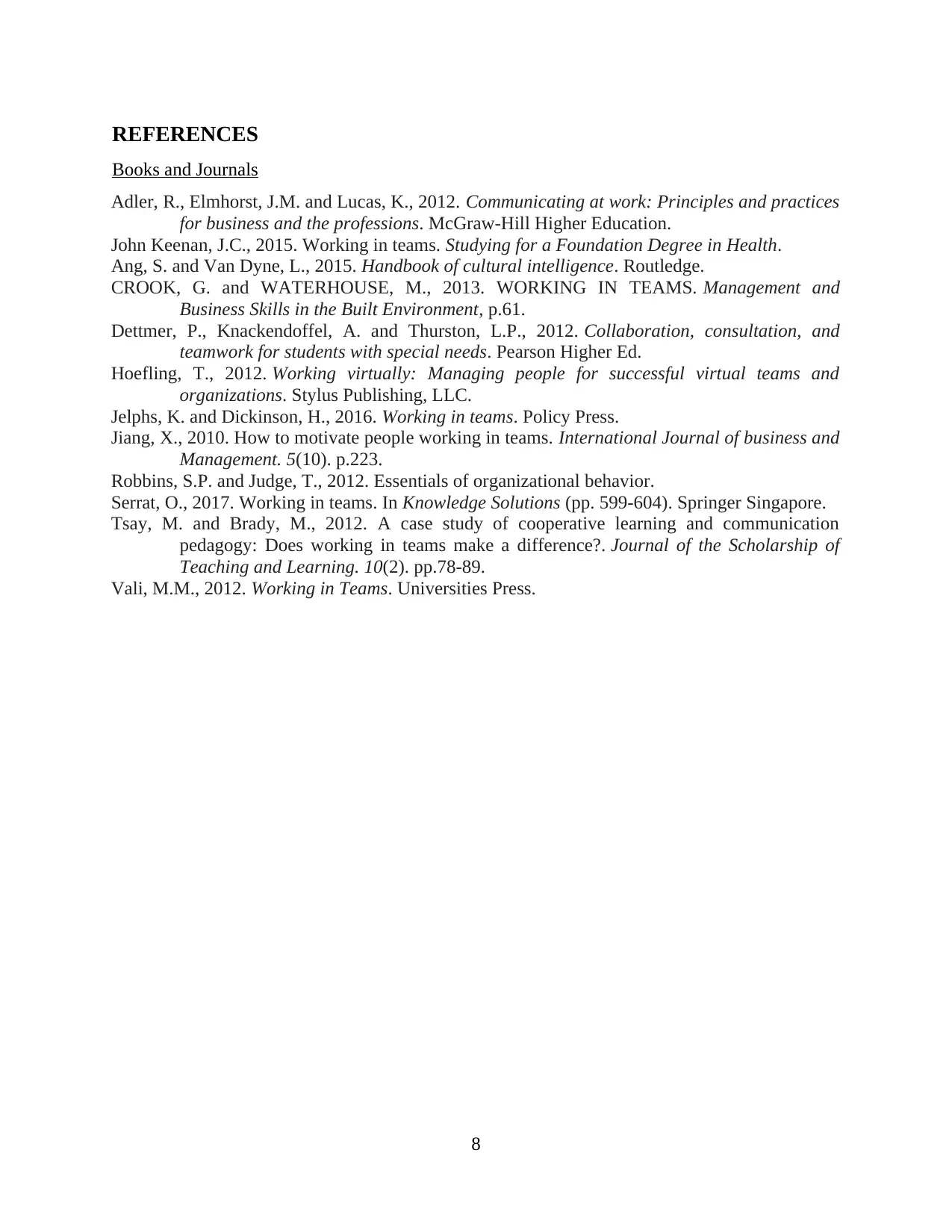
REFERENCES
Books and Journals
Adler, R., Elmhorst, J.M. and Lucas, K., 2012. Communicating at work: Principles and practices
for business and the professions. McGraw-Hill Higher Education.
John Keenan, J.C., 2015. Working in teams. Studying for a Foundation Degree in Health.
Ang, S. and Van Dyne, L., 2015. Handbook of cultural intelligence. Routledge.
CROOK, G. and WATERHOUSE, M., 2013. WORKING IN TEAMS. Management and
Business Skills in the Built Environment, p.61.
Dettmer, P., Knackendoffel, A. and Thurston, L.P., 2012. Collaboration, consultation, and
teamwork for students with special needs. Pearson Higher Ed.
Hoefling, T., 2012. Working virtually: Managing people for successful virtual teams and
organizations. Stylus Publishing, LLC.
Jelphs, K. and Dickinson, H., 2016. Working in teams. Policy Press.
Jiang, X., 2010. How to motivate people working in teams. International Journal of business and
Management. 5(10). p.223.
Robbins, S.P. and Judge, T., 2012. Essentials of organizational behavior.
Serrat, O., 2017. Working in teams. In Knowledge Solutions (pp. 599-604). Springer Singapore.
Tsay, M. and Brady, M., 2012. A case study of cooperative learning and communication
pedagogy: Does working in teams make a difference?. Journal of the Scholarship of
Teaching and Learning. 10(2). pp.78-89.
Vali, M.M., 2012. Working in Teams. Universities Press.
8
Books and Journals
Adler, R., Elmhorst, J.M. and Lucas, K., 2012. Communicating at work: Principles and practices
for business and the professions. McGraw-Hill Higher Education.
John Keenan, J.C., 2015. Working in teams. Studying for a Foundation Degree in Health.
Ang, S. and Van Dyne, L., 2015. Handbook of cultural intelligence. Routledge.
CROOK, G. and WATERHOUSE, M., 2013. WORKING IN TEAMS. Management and
Business Skills in the Built Environment, p.61.
Dettmer, P., Knackendoffel, A. and Thurston, L.P., 2012. Collaboration, consultation, and
teamwork for students with special needs. Pearson Higher Ed.
Hoefling, T., 2012. Working virtually: Managing people for successful virtual teams and
organizations. Stylus Publishing, LLC.
Jelphs, K. and Dickinson, H., 2016. Working in teams. Policy Press.
Jiang, X., 2010. How to motivate people working in teams. International Journal of business and
Management. 5(10). p.223.
Robbins, S.P. and Judge, T., 2012. Essentials of organizational behavior.
Serrat, O., 2017. Working in teams. In Knowledge Solutions (pp. 599-604). Springer Singapore.
Tsay, M. and Brady, M., 2012. A case study of cooperative learning and communication
pedagogy: Does working in teams make a difference?. Journal of the Scholarship of
Teaching and Learning. 10(2). pp.78-89.
Vali, M.M., 2012. Working in Teams. Universities Press.
8
1 out of 11
Related Documents
Your All-in-One AI-Powered Toolkit for Academic Success.
+13062052269
info@desklib.com
Available 24*7 on WhatsApp / Email
![[object Object]](/_next/static/media/star-bottom.7253800d.svg)
Unlock your academic potential
Copyright © 2020–2026 A2Z Services. All Rights Reserved. Developed and managed by ZUCOL.




